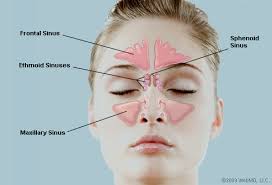sinus
英 ['saɪnəs]
美 ['saɪnəs]
sinus 鼻窦,窦道来自拉丁语 sinus,弯,曲,转,后用于解剖学术语指鼻窦,窦道等。
- sinus
- sinus: see sine
- sinus (n.)
- "hollow curve or cavity in the body," early 15c., from Medieval Latin sinus, from Latin sinus "bend, fold, curve, a bent surface; a bay, bight, gulf; a fold in land;" also "fold of the toga about the breast," hence "bosom," and figuratively "love, affection, intimacy; interior, inmost part;" of unknown origin.
- 1. I still suffer from catarrh and sinus problems.
- 我仍然患有黏膜炎和鼻窦炎。
来自柯林斯例句
- 2. Sinus arrhythmia also tends to disappear with advancing age.
- 随着年龄的增长,窦性心律不齐也趋于消失.
来自辞典例句
- 3. This normal variation in rhythm is known as sinus arrhythmia.
- 节律的这种正常变化称为窦性心律失常.
来自辞典例句
- 4. Sinus bradycardia occurs when the heart rate falls below 60.
- 窦性心动过缓是心率低于60次.
来自辞典例句
- 5. Reversion to sinus rhythm , by means of electrical countershock , is indicated.
- 可用电除颤使恢复窦性 节律 .
来自辞典例句
[ sinus 造句 ]
